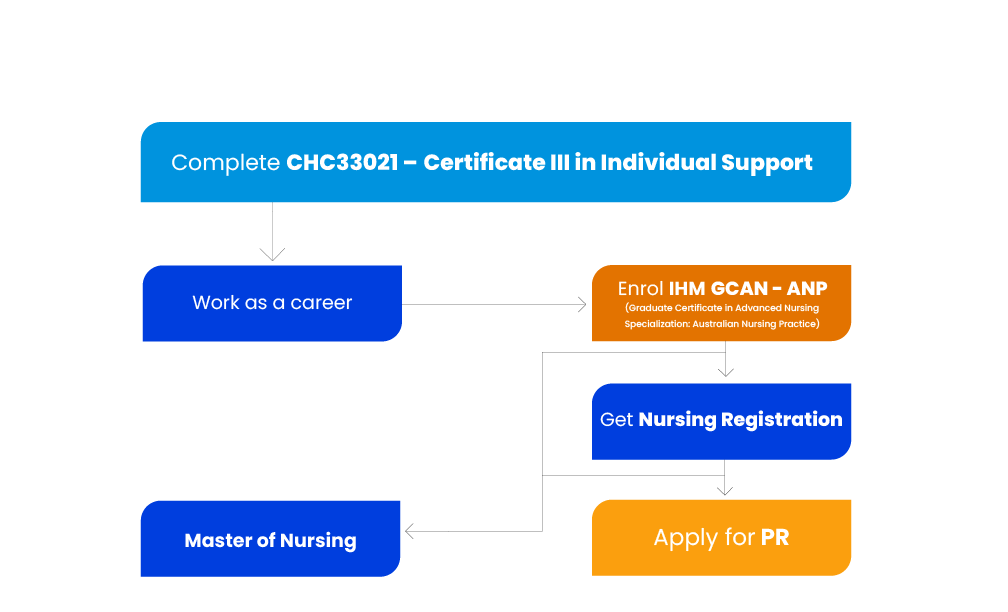-
AQF Level
3
-
Course Duration
775 Hours
-
Course Fee
1,750 AUD
-
Mode of Delivery
Online Blended
AQF Level
Course Duration
Course Fee
Mode of Delivery
The CHC33021 Certificate III in Individual Support (Ageing and
Disability) is a vocational qualification that prepares individuals to work in the aged
care and disability support sectors in Australia. It equips students with the necessary
knowledge and skills to provide person-centered support to elderly individuals and
people with disabilities.
Upon completion of the course, graduates may seek employment in various roles, such as aged care worker, disability support worker, community support worker, or personal care assistant. They can work in residential aged care facilities, disability service organizations, home care settings, or community support programs.
The latest data are for the five years from November 2021 to November 2026. Over this period, the number of workers:
IHNA (Institute of Health and Nursing Australia) is trusted by more than 22,000+ students and has been committed to providing excellence in education and training to meet the needs of the community since 2007.


Our course provides hands-on training to help you develop essential caregiving skills, including assisting with daily activities, supporting client well-being, and contributing to the overall care team.
IHNA’s curriculum is designed to align with Australian industry standards, ensuring you acquire the knowledge needed to excel in your caregiving role. You will learn about the Australian healthcare system, person-centered care, infection control, and much more.
Our highly experienced and qualified trainers bring their expertise and industry insights into the classroom, helping you gain practical knowledge and prepare for the challenges and opportunities you may encounter in the field.
IHNA provides comprehensive career guidance and support services to assist you in navigating the Australian job market successfully. From resume building to interview preparation, we are committed to helping you secure employment in your desired caregiving role.

* Aboriginal and Torres Strait Islanders’ students are encouraged to apply.
Online theory with simulation workshop and work placement
This course is provided through the online, blended mode of delivery. It will be delivered over 775 hours, including self-paced structured e-learning as per the session plan, on-campus simulation training, assessment, and 120 hours of work-based training / professional experience placement (PEP).
Students are advised that they will be required to do unstructured self-learning. Weekly support sessions are available for this course if you require any assistance.
Please call our friendly admissions team to know more about the course.
From within Australia : 1800 934 265, From outside Australia : +61 37046 7799
With Certificate III in Individual Support (Ageing, Disability) qualification in hand, graduates of the course will be able to work as a/an:


PhD in Life Science
Dr. Arun Koorapally Subash is the National Training Manager at the Institute of Health and Nursing Australia (IHNA). He has been associated with the institute since 2015 and has played an integral role in its success over the years.
With more than 10 years of experience in various healthcare settings, Arun has worked as an experienced disability support worker as well as in educator roles. His broad experience has provided him with valuable insights into the healthcare industry, which he brings to his role as National Training Manager.
Arun holds a PhD in Life Science from India, which has given him a strong foundation in the field of health and wellbeing. Additionally, he has advanced skills and knowledge in the area of disability support, home and community care, first aid, preventing dementia, and other related fields. His expertise and knowledge in these areas make him a valuable member of the IHNA team.
Designation :National training manger
Email : arun@healthcareers.edu.au




15 units are required for award of this qualification including:
CHCDIV001
Work with diverse people
HLTWHS002
Follow safe work practices for direct client care
CHCCOM005
Communicate and work in health or community services
CHCLEG001
Work legally and ethically
CHCCCS041
Recognise healthy body systems
CHCCCS031
Provide individualised support
CHCCCS040
Support independence and wellbeing
CHCCCS038
Facilitate the empowerment of people receiving support
HLTINF006
Apply basic principles and practices of infection prevention and control
CHCAGE011
Provide support to people living with dementia
CHCAGE013
Work effectively in aged care
CHCPAL003
Deliver care services using a palliative approach
CHCDIS011
Contribute to ongoing skills development using a strengths-based approach
CHCDIS012
Support community participation and social inclusion
CHCDIS020
Work effectively in disability support
Total number of units for this course = 15
9 Core units
6 Elective units
A convenient way to build your employability skills and advance your career
01

Adam Gardoll
The staff in my opinion are all supportive and friendly and I am enjoying my studies here.
02

Ashley Hartnett
The facilities are continually improving and the support I have acquired is unlike any other school.
03

Baby Aurora Trijo
The dedication, support and motivation of each staff member is great and enables students like myself to achieve their dream.
04

Christian Pascaran
The Staff/educators were very helpful to students when it came to addressing our problems.
05

Jismy Ouseph
I am really thankful to IHNA Online which gave me the confident and exposure to my nursing career.
IHNA (Institute of Health and Nursing Australia) is trusted by more than
22,000+ students and has been committed to providing excellence in education and
training to meet the needs of the community since 2007.

Applicants are required to be 18 years old and above

Successful completion of an Australian Year 10 qualification or equivalent

Language, Literacy and Numeracy (LLN) requirement preferred by IHNA

Mature age students (22+) may also be considered without the minimum education requirements. Each case will be reviewed individually to ascertain the capacity of the applicant to meet course requirements.

Basic computer skills includes word processing, using spreadsheets creating presentations; finding information and communicating using computers; and being aware of social and ethical implications of Internet use.
Having own computer (desktop or laptop) to facilitate the training and assessment.
*In the event that a student fails to meet the mentioned requirements, it may lead to exclusion from their practical placements, which could potentially result in an unsuccessful completion of the course.
Students may progress to higher level courses within and/or across the community/health sector such as:
Overseas Nurses can complete the theory online and move to Australia for Simulation and practical placement. These nurses will get higher opportunity as they can visit workplaces directly.
Optionally they can further study into GCAN-ANP course or Master of Nursing with IHM if they wish to choose study pathway.

IHNA Online has defined entry requirements for courses under its mandate, as outlined by its ‘Application and Enrolment Procedure for Courses,’ to ensure that students meet industry standards.

* Aboriginal and Torres Strait Islanders’ students are encouraged to apply.
Overseas Nurses and other healthcare support workers have the option to undergo any or all the following Skill Assessments to explore job opportunities in Australia under the new Aged Care Labour Agreement. These assessments are required to be completed by candidates nominated by an employer under the Aged Care Industry Labour Agreement, and ensure a potential migrant’s skills meet the industry standards required to work in one of the three occupations listed below
Under the Direct Care Occupation Skills Assessment category, ANMAC will assess applications to support the Australian Government’s Aged Care Industry Labour Agreement for the below two occupations.
if you wish to obtain assistance with preparing and submitting your Skills Assessment with ANMAC or ACWA.
Click Here
With RPL we assess your competency based on formal, non-formal, informal learning or direct work experience based on the required skills of the course
We use CT where you’ve completed units of study at another TAFE College or Registered Training Organisation that meet the requirements of another course. We grant credit according to the Certification, Issuing, and Recognition of Qualifications and Statements of Attainment. Assessing a CT is free.
If you’re eligible for RPL or CT you may be able to complete the course in a shorter duration with reduction to total course fees. Check your eligibility with us.
Any other questions in your mind – let us give you some more clarity with the following FAQs:
